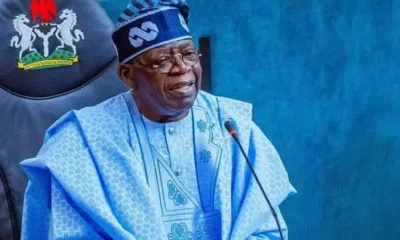News
US Court Orders FBI, DEA To Release Tinubu’s Investigation Records

A U.S. federal judge has ordered major American law enforcement agencies, including the Federal Bureau of Investigation (FBI) and the Drug Enforcement Administration (DEA), to release documents relating to an alleged federal investigation involving Nigeria’s President, Bola Tinubu, in the 1990s.
According to court filings seen by Premium Times, which reported the story, Judge Beryl Howell of the U.S. District Court for the District of Columbia issued the ruling on Tuesday, declaring that the agencies’ decision to withhold the requested information under so-called “Glomar responses” – a refusal to confirm or deny the existence of documents – was “neither logical nor plausible.”
The ruling comes in response to a 2023 lawsuit filed by U.S. transparency advocate Aaron Greenspan under the Freedom of Information Act (FOIA).
Greenspan alleged that the FBI, DEA, Internal Revenue Service (IRS), Executive Office for U.S. Attorneys (EOUSA), the Department of State, and the Central Intelligence Agency (CIA) violated FOIA by failing to disclose records relating to President Tinubu and other individuals allegedly associated with a heroin trafficking and money laundering network in Chicago in the early 1990s.
President Tinubu has long faced scrutiny over a civil forfeiture case in the United States.
In 1993, U.S. authorities seized and eventually confiscated $460,000 from accounts linked to him, alleging the funds were proceeds from narcotics-related financial activities. Tinubu, who at the time lived in Chicago and worked in the financial services sector, has maintained that the funds were legally earned and denied involvement in any criminal activity.
He was never charged with a crime.
The forfeiture resurfaced during Nigeria’s 2023 general elections, where it became a major point of contention in legal challenges brought by opposition candidates Atiku Abubakar and Peter Obi.
Both claimed the forfeiture undermined Tinubu’s eligibility to contest the presidency.
However, Nigeria’s Presidential Election Petition Tribunal ruled in Tinubu’s favour, upholding his electoral victory and dismissing the challenges.
In the FOIA requests filed between 2022 and 2023, Greenspan sought documents related to what he described as a joint investigation conducted by the FBI, IRS, DEA, and U.S. Attorney’s Offices in the Northern Districts of Illinois and Indiana.
He named four individuals as subjects of interest: Bola Ahmed Tinubu, Mueez Abegboyega Akande (Tinubu’s late associate), Lee Andrew Edwards, and Abiodun Agbele.
All responding agencies declined to acknowledge whether such records existed.
Greenspan appealed these “Glomar responses” and, after exhausting administrative remedies, filed a lawsuit on June 12, 2023.
He later sought an emergency hearing in October 2023 to compel the immediate release of documents, citing the Nigerian Supreme Court’s upcoming review of Tinubu’s election. The motion was denied, but it significantly raised the profile of the case.
On the same day, President Tinubu moved to formally intervene in the matter, citing privacy concerns under U.S. law.
His legal team argued that releasing the requested documents – including tax filings or law enforcement communications – would infringe on his personal rights.
Judge Howell’s decision represents a partial victory for Greenspan, requiring the agencies to process and release any non-exempt documents responsive to the FOIA requests.
Legal experts say while it does not compel the release of sensitive classified or privacy-protected information, it opens the door for potential public disclosure of long-sought records concerning Tinubu’s past in the United States.
They also say the ruling could have diplomatic and political implications, especially as President Tinubu navigates both domestic and international scrutiny over his administration’s reform agenda and rising calls for transparency.
The affected U.S. agencies are now expected to review the records and comply with the court’s directive in the coming weeks, unless an appeal is filed.
-

 News4 days ago
News4 days agoInsecurity: Kogi Schools Resume On Monday
-

 Opinion4 days ago
Opinion4 days agoDon’t Pull the Plug: Why Nigerians Are Pleading for the U.S. to Extend Its Police Training Program — and Why It Must Synergize With New Military Arrivals
-

 Crime3 days ago
Crime3 days agoVigilante Reportedly Shoots Colleague Dead In Plateau
-

 Crime5 days ago
Crime5 days agoPolice Arrest Two Over Murder Of 62-Year-Old Woman In Oyo













